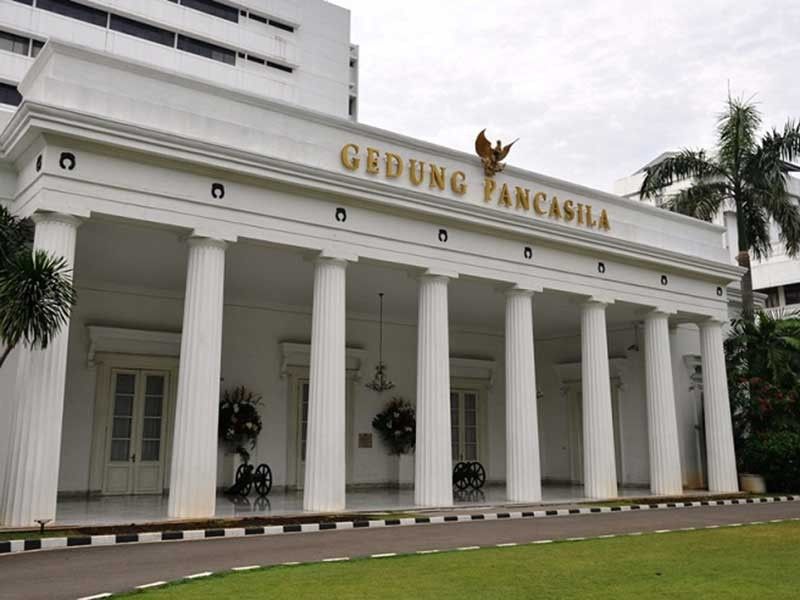Commentary: Indonesia's New Year's message to China over Natunas dispute: A game changer?

MANILA, Philippines — A statement issued on New Year’s Day by the Indonesian Ministry of Foreign Affairs against alleged Chinese encroachments over the Indonesian Exclusive Economic Zone (EEZ) in the Natunas may prove to be a diplomatic and legal game changer in the increasingly volatile South China Sea.
For the very first time, a third party Association of Southeast Asian Nation (ASEAN) member- state invoked the landmark 2016 arbitral ruling in the South China Sea case filed by the Philippines three years earlier against Chinese expansionist moves in the region.
Indonesia’s broadside came following alleged incursions by Chinese coastguard vessels in the Natuna Sea, which lie nearly 1,100 kilometers south of the Spratlys in the South China Sea. It features an archipelago of 271 islands and resource-rich waters.
China claims the Natunas is subject to its jurisdiction under the UN Convention on the Law of the Sea (UNCLOS) as “relevant” waters that had been visited by Chinese fishermen since time immemorial.
A blunt rebuff
The Indonesian MFA however said the Chinese claim is without any legal basis under the UNCLOS, adding that its claims of historic rights have all been repudiated by the Permanent Court of Arbitration’s 2016 ruling.
In addition, Indonesia bluntly rejected any suggestion of bilateral talks with China to delimit what the latter says are overlapping maritime jurisdictions, as there are none to speak of. .
“Based on UNCLOS 1982, Indonesia does not have overlapping claims with the PRC [People’s Republic of China] so that it is not relevant to have any dialogue on maritime boundary delimitation,” the four-paragraph Indonesian statement said in part, according to a rough translation of the original Bahasa Indonesia.
Too, under UNCLOS rules, recognition by Indonesia of any maritime overlap forecloses any resort to the landmark treaty’s compulsory dispute mechanisms successfully used by the Philippines to bring China to arbitration, despite the latter’s fierce objections.
Thus, the Indonesian statement may also be sending China a subtle signal that any further unwelcome acts in the Natunas may force Indonesia’s hand to steer for a direction Beijing would not want to take itself – yet another arbitration case where it will have little control of the outcome.
China appears to expand the exception outlined by PCA to the UNCLOS regime that allows traditional fishing in territorial waters by competing claimants (as it so held on the question of Scarborough Shoal claimed by both the Philippines and China).
But notably, the Arbitral Court stopped short of saying traditional – or subsistence – fishing may also apply to the EEZ, a ruling that comports with established international norm on the question.
What UNCLOS does allow in the EEZ is fishing for the “surplus catch” by other states outside of the coastal state’s Total Allowable Catch (TAC), a scientific measure of that state’s fishing capacity, but only with the latter’s consent.
Ironically, during the UNCLOS negotiations, China itself had questioned the allotment of a surplus catch in the EEZ allowed for other states, saying that developing countries should be allowed to keep all fishery resources for itself, as noted by the PCA in its judgment on the Philippine arbitral case against China.
In any case, Chinese poaching in the EEZs of its ASEAN neighbors can hardly be considered subsistence fishing. Instead, it often involves what experts call China’s “Second Surging Sea Force” network of large fishing fleets working in tandem with Chinese navy and Coastguard vessels.
A loud chorus from the ASEAN trio
Jakarta’s rebuff of Beijing forms part of an increasingly loud chorus of opposition to China’s expansionist moves in the South China Sea, as it joins formal moves by two other major economies — Malaysia and Vietnam — to set aside the Chinese Nine Dash Line-claim in favor of accepted international rules.
In November last year, a top Vietnamese diplomat announced that his country is now seriously considering following Manila’s earlier lead to bring China to arbitral court over repeated Chinese intrusions in Vietnam’s Vanguard Bank, an oil-rich section of its EEZ.
Malaysia followed this up in late December by filing with the United Nations a claim for an Extended Continental Shelf (ECS). It made the filing under Article 76 of the UNCLOS, which allows a coastal state to claim the outer limits of its continental shelf beyond the 200-mile limit, for an additional 150 miles, under certain geological conditions. It is a legal move that also eats substantially into the Chinese Nine Dash Lines.
On January 3, or two days after the Indonesian MFA’s declarations, Malaysia’s own Ministry of Foreign Affairs issued a statement saying it does not fear Chinese reprisals over its ECS filing.
The three countries’ combined message should unsettle China, as it confirms Beijing’s failure to marshal support among the region’s biggest economic and political players — not counting the Philippines — for its rejection of the PCA’s ruling striking its Nine Dash Line-claim.
Beijing, in utter disregard of the ruling, then embarked on a building spree — now largely completed — over maritime features declared by the PCA as part of the Philippines’ EEZ.
Indonesia, along with Vietnam, Malaysia, Japan, and Thailand, had each sent a diplomatic observer to the Permanent Court of Arbitration proceedings at the Hague where the Philippine arbitral case against China was heard. With the exception of Thailand, all the countries have a running maritime dispute with China.
During the PCA hearings in the Philippine case, Vietnam had as well filed a brief supporting Manila’s case against China.
Ironically, with the election to office of President Rodrigo Duterte in June 2016, Manila has backpedaled on its stance towards China, opting to take a conciliatory route towards Beijing. Manila had filed the arbitral case under during the administration of Benigno Aquino III, his predecessor.
Three years into his term, Duterte, in addition to his contradictory statements over the country’s arbitral case victory, has so far continued his policy of rapprochement towards China, despite it not sitting well with most of the Filipino populace, not to mention, with his own military advisers.
ASEAN chairmanship change
New Year’s Day also triggered a change in leadership of the ASEAN under the regional grouping’s charter, with its chairmanship automatically vested for a one-year term with Vietnam, from Thailand’s in 2019.
Article 31 of the ASEAN Charter provides that “the Chairmanship of ASEAN shall rotate annually, based on the alphabetical order of the English names of Member States.”
Vietnamese chairmanship of the regional grouping may also prove pivotal to current ASEAN efforts at crafting a binding Code of Conduct regulating the actions of rival claimants in the region.
This—and the ASEAN trio’s open defiance of China on the South China Sea question—may yet push Duterte to rethink his own options towards Chinese occupation of maritime features that, according to the PCA, are part of the Philippines’ own EEZ.
(Romel Regalado Bagares, an alumnus of the University College of Law and the Vrije Universiteit Amsterdam, teaches public international law at the Lyceum Philippines University College of Law, and is treasurer of the Philippine Society of International Law.
(VERA Files is put out by veteran journalists taking a deeper look at current issues. Vera is Latin for “true.”)
- Latest




























